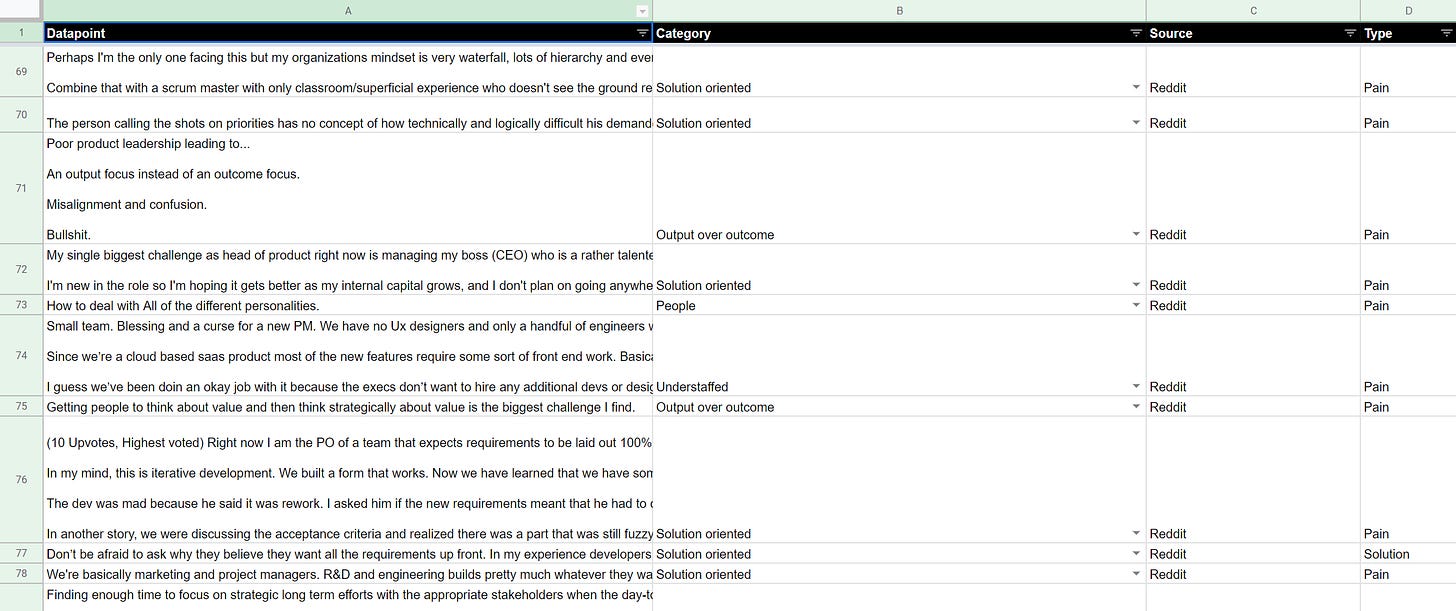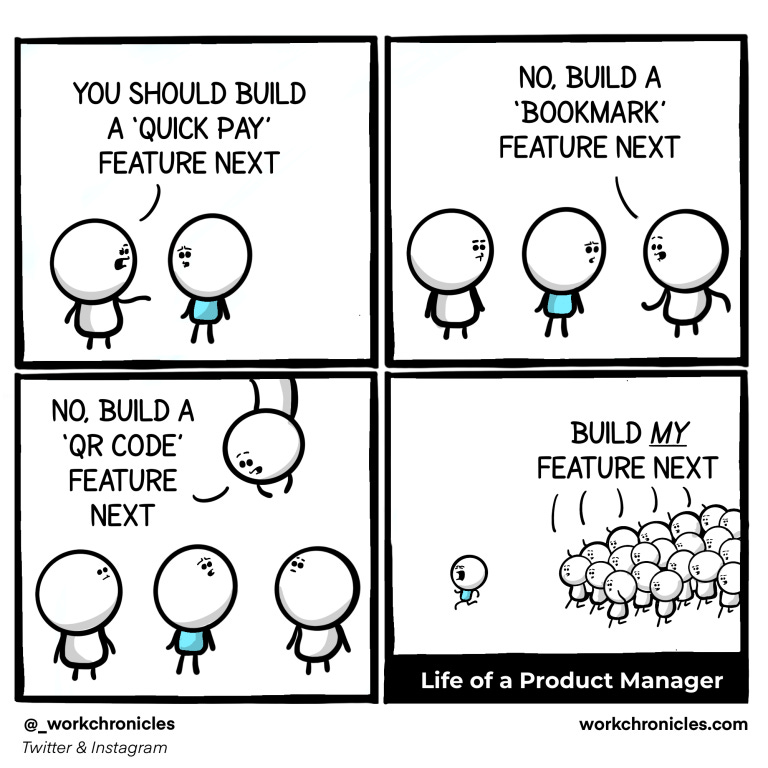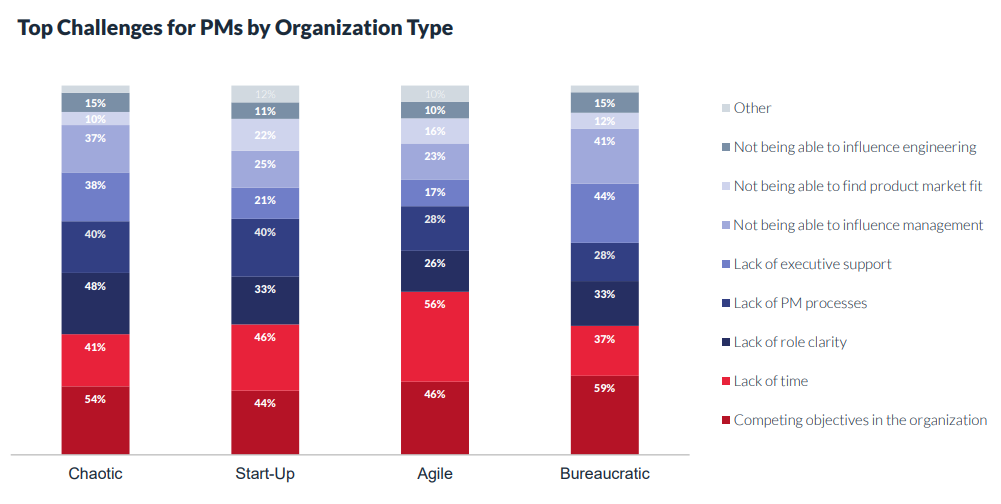In most companies Product Management is broken.
PM's feel like they are:
🏭 In a feature factory. Sales or a visionary CEO are pushing solutions. PM's feel like Project Managers with little influence on the product strategy. They have difficulty changing the organisation to a product mindset.
😓 Overwhelmed by competing and shifting priorities. PM's don't know what to focus on and have a hard time balancing it all. They feel like they have to fight fires constantly.
Recognize these? You are not alone.
The Struggle of being a PM
Skim the PM communities and comments like these are typical:
"I am a solo pm at a midsized company and I am drowning in responsibilities. From time to time I get anxiety about my performance not being good enough [....] The areas that are suffering are the vision and product strategy. [...] The pressure from the organization feels like I need to spend more time in those areas but I am having a hard time balancing it all."
Sounds pretty bad right? Recently I started wondering. How widespread are these issues? Why are they so persistent? Are they part of the job, or can we fix them?
I started logging every comment expressing a pain or a desire:
When I was satisfied with the amount of samples, I categorized them.
This is what I found:
Top 2 Pains:
1. A lack of influence over the product strategy. In a Feature factory. (40%)
2. Overwhelmed by competing and shifting priorities (24%)
This investigation confirmed a hunch. Many PM's struggle with a lack of influence over product strategy.
It's not surprising that this cartoon is a top post on the Product management Reddit:
Industry Research
Do these findings reflect what is going on in the industry at large? A recent survey by Product Management Festival (2020) under 2000+ product professionals, seems to indicate so.
It looks like Lack of executive support and Not being able to influence management map pretty well to our top pain 1. A lack of influence over the product strategy. Competing objectives and Lack of time fit well with our second pain of being 2. Overwhelmed by competing and shifting priorities.
In a report by Feedback Loop (2020) the top wish was a clearer product strategy:
This shows PM's see the importance of a clear product strategy,
but lack the influence to realize it.
Digging deeper
Having established these problems are widespread, I wanted to dig deeper.
How critical are these problems? What is their impact? To answer these questions, I decided to offer myself as a coach for PM's on Reddit, hoping I would find traction by using the keywords from my research:
I did not expect what happened next. Within a week I received 57 coaching requests! This was great but also terrifying. I have a dayjob and these sessions would be done after-hours. Fortunately, with permission from the participants, I was able to share the load with the venerable @uxdesigntom (thanks Tom)!
The variety of PM's that signed up was broad except for a bias to the inexperienced side. Does this mean it's mostly inexperienced PM's that suffer from these problems? I also guess few people are interested in getting coached by someone with less experience.
To understand how critical the problems these PM's experience are I asked:
On a scale of 1 to 10 where 1 is not very important and 10 is very important, how important is it for you to solve your struggle?
The average of all of the 59 coaching requests, was a whopping 9.1 out of 10.
This wasn't proof yet the problems are critical, but it sure seemed like it.
Coaching sessions
In the weeks that followed, I coached 19 PM's across the globe (from California to Singapore). This was fun. I was grateful for the opportunity to talk to so many different people about the craft I love. But however diverse my coachees, their issues were similar. It confirmed my earlier research.
Most PM's suffer from 1. A lack of influence on the product and are
2. Overwhelmed by competing and shifting priorities.
Let's go down the rabbit hole.
1. A lack of influence on the product
PM's are sold on the vision of the Product Manager as the CEO of the product. They expect to get a central role in defining the product strategy and this is what attracts them to the job. But the ideal that they read about in books doesn't match up with how it works in practice.
When asked about this ideal, they would invariably give me a regretful laugh.
"Yeah, that's not how it works for me. I loved reading "Inspired", but it also makes my issues seem insurmountable."
Instead, they found themselves in an organisation lacking the "Product-Mindset". Rather than being managed by outcomes (like the ideal prescribes), they are managed on outputs. A true feature factory. More than once I heard a mention of either an ideas CEO or sales forcing solutions on them. They feel out of the loop of the decision making process. They lack influence on the product strategy. In a recent Tweet, Ryan Singer (Product Strategist at Basecamp) points to the same uncomfortable truth:
In reality very few Product Managers actually decide what to do. It's coming down to them from a stakeholder.
- Ryan Singer
The PM's I spoke to believe the solutions that get pushed are often devised without an understanding of the customer.
"The bigger customers dominate what gets built. We do it because we're afraid of them churning. When we do it, the customer doesn't churn but the features aren't actually used."
On top of this, priorities are also constantly shifting. New solutions are pushed, before the previous are seen to completion. Management is seen as reactive.
There is a lack of focus. A missing committment to the long-term. Multiple PM's unpromptedly coined the term Shiny Object Syndrome to me.
"Executive “shiny object” syndrome where new projects continue to interrupt and disrupt the objectives we’ve mapped out for the half. The lack of focus makes product discovery difficult and the team is spread thin across multiple contexts. Many of our features never reach their true potential due to a lack of iteration — when a project is launched we have to move on to the next."
So what's left when you remove the influence over the product from a Product Manager? A Project Manager. A mercenary, not a missionary:
"Teams of missionaries are engaged, motivated, have a deep understanding of the business context, and tangible empathy for the customer. Teams of mercenaries feel no real sense of empowerment or accountability, no passion for the problem to be solved, and little real connection with the actual users and customers."
- Marty Cagan
The description above by Cagan fits this quote by one of the PM's I spoke to pretty well:
"My understanding is (that the role of a PM is ) to create the context for teams to succeed and collaborate. But now I'm managing timelines for products that are planned. I end up doing a lot of project management work."
Definitely not what they signed up for.
2. Overwhelmed by competing and shifting priorities
This solution oriented and reactive environment has some serious consequences.
It becomes difficult shipping things.
"It's very frustrating. It feels like we're not getting anything done."
To the credit of the PM's I interviewed, they are not looking to change jobs, but are passionate about making it work. More than anything they feel loyalty and responsibility to their teams. They worry about dissatisfaction under engineers and designers.
"I worry about hiring more, because someones whos good at their job will quit. The engineering team is frustrated. I'm frustrated. I believe it can work, but it's not coming to fruition like this."
They also worry about their own career. How can they grow, if all they do is Project management, and not Product management?
"For my career growth, I need to get experience in shipping stuff. But when initiatives get halted like this, I'm not [...getting the experience]"
And this is impacting their confidence:
"Makes me feel uncomfortable, is the org too large? Am I doing it wrong?"
When I told them these problems are common, they would sigh with relief.
"I'm really happy to hear I'm not the only one. At least I'm not alone."
The goal is clear, the road is foggy
It's not a lack of trying. These PM's read books, follow courses, setup strategy meetings, push for OKR's, and much more. Booking this coaching session was just their latest attempt to crack the problem.
This drive comes from their vision of what great looks like.When I asked them about their idea of success, their faces would light up.
"Finally, the team will be calm. We are achieving an impact.We are confident in our ability. We have an influence on the product strategy. And I'm less frustrated."
For many where they want to go is clear.
It's just the road that is foggy.
The root of the problem
Analyzing the PM communities I found 2 problems that keep coming back:
A lack of influence over the product strategy
Overwhelmed by competing and shifting priorities
These problems are frustrating and persistent. PM's try many things to fix these issues. They know where they want to go, but just not how to get there.
So let's figure it out!
In the next part I will attempt to crack this puzzle, by digging deeper into the root of these problems. I will show that a 1. lack of influence is the cause of PM's being 2. overwhelmed.









